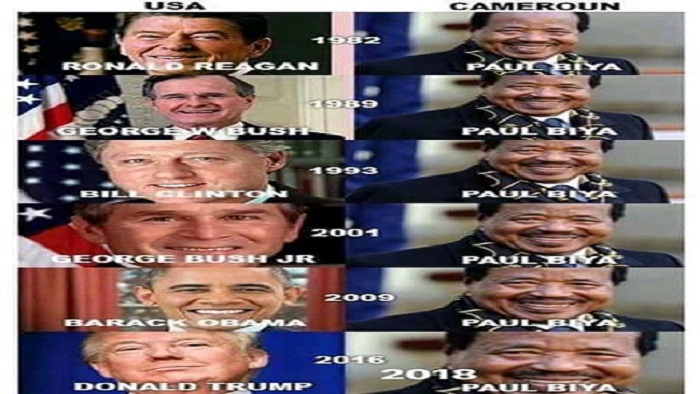Biya’s Cameroon political story and the role of Gaga Haman Adji
Ahead of the October 22 announcement of Cameroon’s presidential election results, the country is beset by crisis in its Anglophone Southwest, a separatist uprising with roots in the pre-World War I era when Cameroon was a German colony. Cameroonians went to the polls on October 7 to elect a new president in which eight candidates challenged the incumbent Paul Biya, one of the world’s longest serving presidents. The 85-year old Biya has been in office for 36 years, longer than the age of most of the country’s population. Cameroon’s electoral law states election results are proclaimed by the Constitutional Council 15 days after the polls. It forbids early publication of results.
Tension is already mounting across the country. Hundreds of people recently demonstrated in the streets of the capital Yaounde, urging Biya to step down. They said their candidate, Maurice Kamto of the Cameroon Renaissance Movement Party won the presidential election. The demonstration began after Kamto declared victory in the polls, without giving any election figures. The ruling Cameroon People’s Democratic Movement organized a news briefing that was broadcast live on state TV to counter Kamto’s declaration, saying he wanted to win power at all costs. It accused Kamto of breaking the law by saying he won the election. Kamto was however not the only candidate that claimed victory. Cabral Libii of the Universe Party also announced he was leading the vote count.
Their action suggests that these politicians did this to cause an uprising. Another opposition candidate, Garga Haman of the Alliance for Democracy and Development, said the two candidates want to create social unrest to oust President Biya.
“Those two candidates are in a hurry to be president. Not yet my dear friends, not yet. Let us wait for the decision of the constitutional council. There is no reason to go on to the streets. Do not exploit the mentality of the youths,” he said.
Many Cameroonians reportedly have little faith in the system and do not expect Biya to concede in the unlikely event that he loses. Biya controls the police and military forces and has substantial influence over the electoral commission; he also regularly appoints its chief. Its board members only quit their ruling party membership the day their appointments were announced. The president also appoints all judges in the country.
Cleric Rigobert Gabanmidanha of the Live and Peace Ministry also petitioned for the cancellation of the polls. He said the constitutional council that certifies election results is controlled by Biya and that many opposition supporters like himself were not allowed to vote. Thirteen of the petitions to annul the election were from another would-be presidential candidate, Bertin Kisob, who said members of his Cameroon Party for Social Justice reported irregularities and fraud that favored Biya. Cameroon’s election body, ELECAM, which said it has received 25 petitions from candidates and voters calling for the cancellation of the presidential election, has denied any vote-rigging. All said, we feel that the October 7 polls left much to be desired.
Should President Biya be declared the winner, Cameroon will continue its downward trajectory with the real possibility of increased violence, human rights abuses and impunity that has long characterized Biya’s rule. On the other hand, the opposition parties are rudderless and deeply divided. Also worrisome is the level of hate speech in recent times, with politicians accused of stoking tribal tensions between the Bamileke and Beti, two of Cameroon’s major ethnic groups.
Already there are talks of unseating President Biya through mass protest which we fear could be a prelude to chaos. We urge the opposition to exercise patience and restraint. They should be encouraged by recent peaceful power changes in Africa, especially in Zimbabwe. They should not go the way of Libya. Whatever the outcome of the election, we urge the winner to urgently engage his opponents in dialogue and find a peaceful way out of the logjam. They should consider the possibility of forming a government of national unity.





